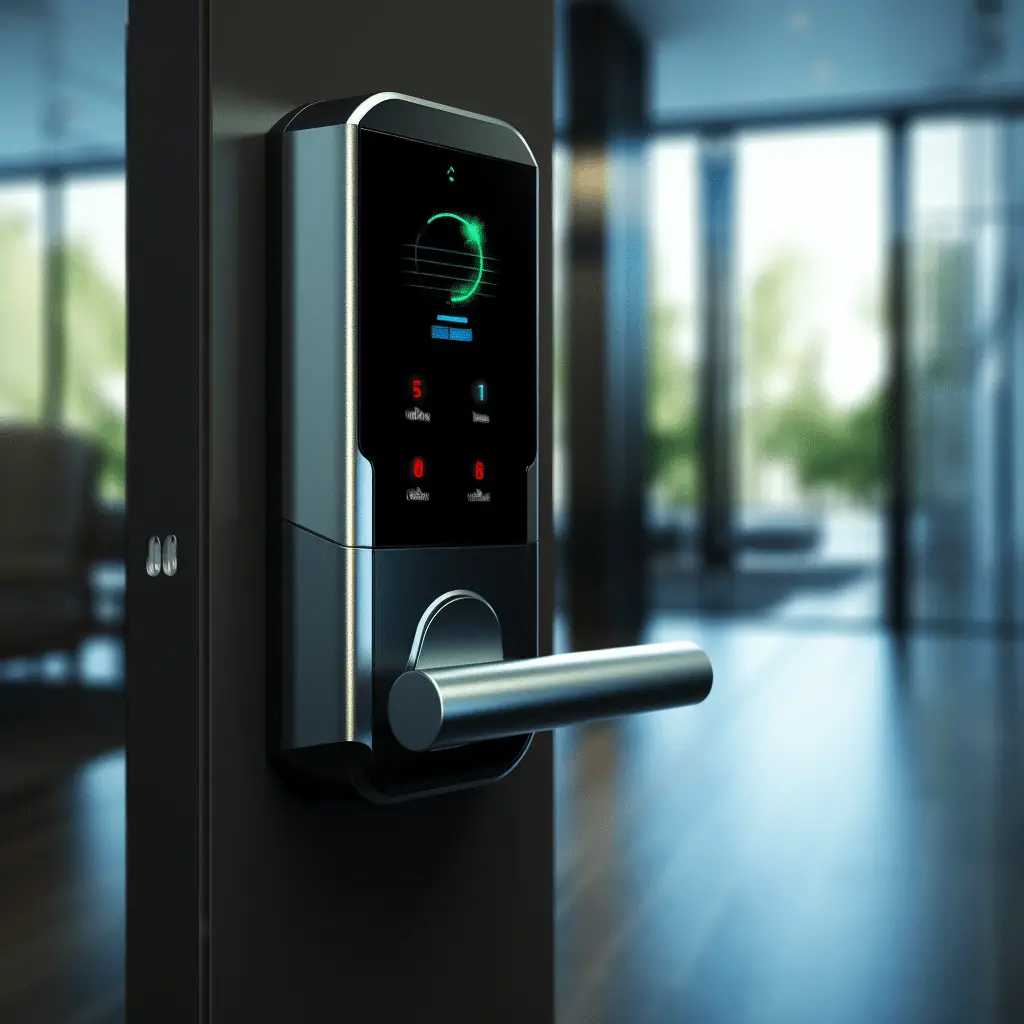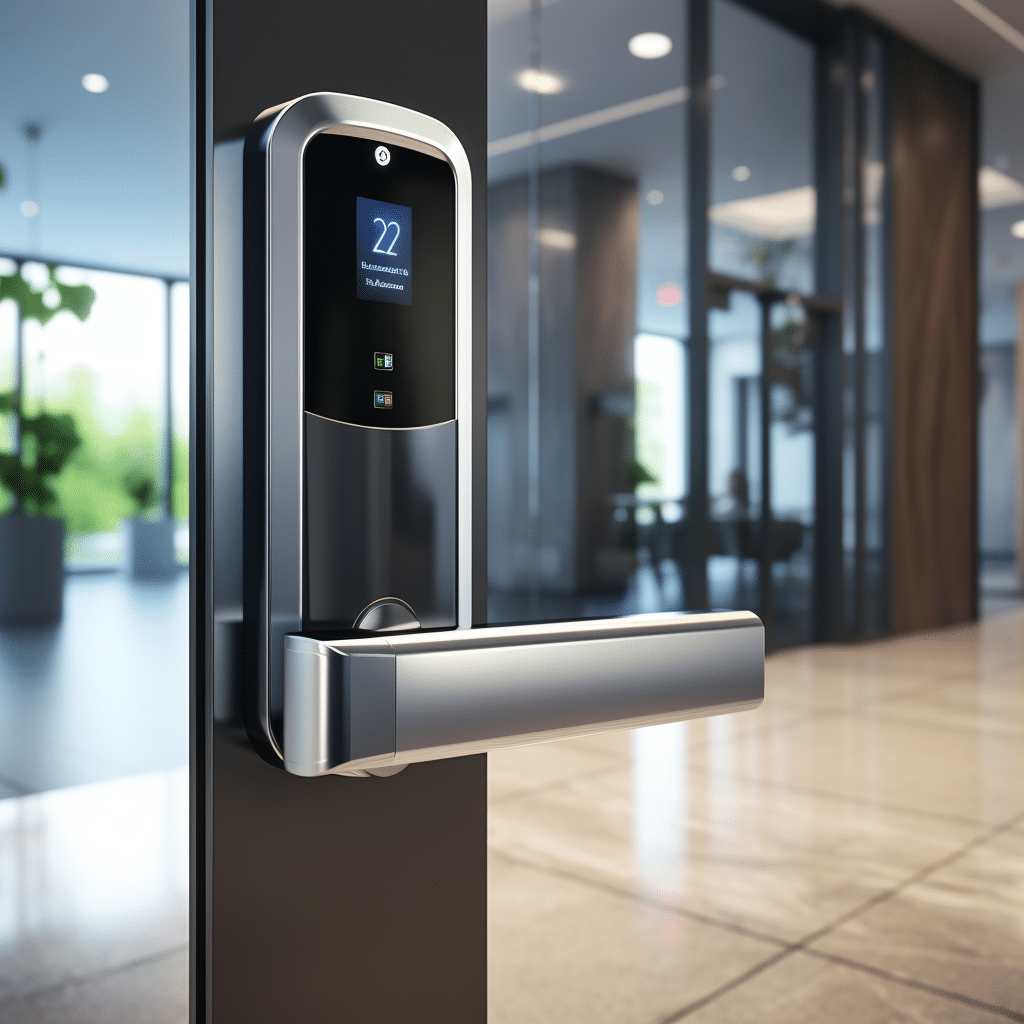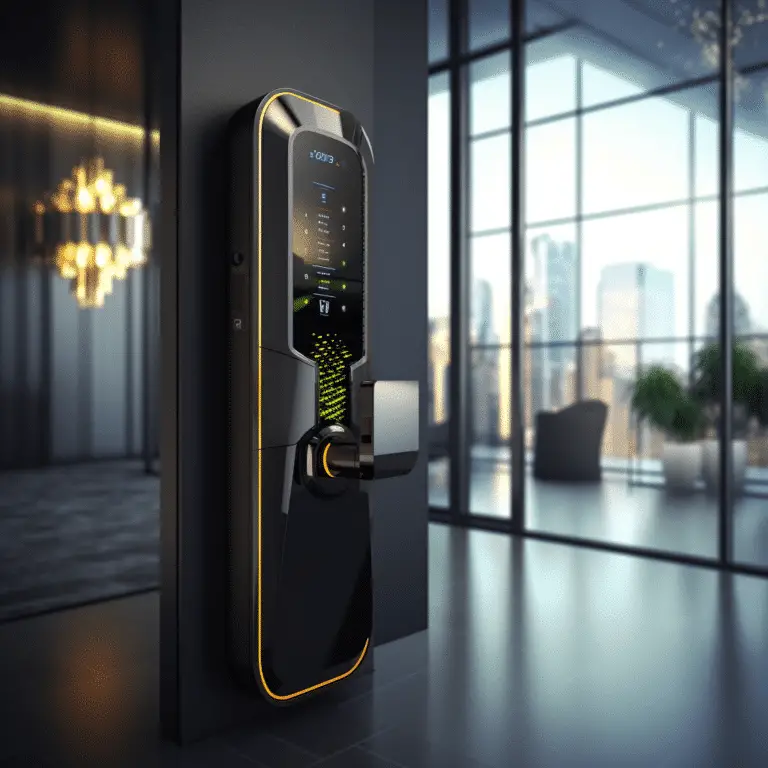The global smart door lock market is experiencing significant growth, driven by factors such as rapid urbanization, increased adoption in residential complexes, and rising concerns about security. Touchless access control systems, in particular, have gained momentum due to the COVID-19 pandemic.
Access control technology has a rich historical background, dating back to ancient times. With the expansion of electricity in the late 1800s, access control became crucial in corporate environments. Over time, access control systems have evolved to include various technologies and solutions, making them an essential part of modern-day security.
The key players in the global smart door lock market include ASSA ABLOY, Honeywell International Inc., Allegion PLC, Xiaomi, and Salto Systems, among others. These companies offer a wide range of smart door lock products and technologies, catering to the diverse needs of residential, commercial, and hospitality sectors.

Key Takeaways:
- Access control technology is experiencing significant growth with the increasing demand for smart door lock systems.
- The market is segmented based on product type, technology, and application.
- The historical development of access control dates back to ancient times, with the first mechanical wooden locks discovered in Assyria.
- Key players in the smart door lock market include ASSA ABLOY, Honeywell International Inc., Allegion PLC, Xiaomi, and Salto Systems.
- Access control systems play a vital role in enhancing security and convenience in various industries.
Key Players in the Smart Door Lock Market
The global smart door lock market is highly competitive, with several key players leading the way in innovation and technology. These companies have established a strong presence in the market, offering a wide range of smart door lock products and solutions to cater to the evolving needs of residential, commercial, and hospitality sectors.
ASSA ABLOY
It is a global leader in access solutions, and their smart door lock offerings are no exception. With a focus on security, convenience, and design, ASSA ABLOY’s smart locks combine cutting-edge technology with sleek aesthetics. They offer a wide range of products, including fingerprint, remote, and electronic cipher locks, ensuring a secure and user-friendly experience.
Honeywell International Inc.
Honeywell is well-known for its wide range of products in many fields. Cutting-edge smart door lock solutions are fully compatible with the company’s other IoT and security offerings.
Allegion PLC
It is a leading provider of security products and solutions, and their smart door locks are no exception. With a focus on advanced technology and connectivity, Allegion’s smart locks offer features such as keyless entry, smartphone compatibility, and remote access control.
Other notable players in the smart door lock market include Xiaomi and Salto Systems, who have also made significant contributions to the industry with their innovative products and solutions. As the market continues to grow and evolve, these key players will play a crucial role in shaping the future of smart door lock technology.
| Key Player | Notable Features |
|---|---|
| ASSA ABLOY | Fingerprint, remote, and electronic cipher locks |
| Honeywell International Inc. | Voice control, integration with virtual assistants |
| Allegion PLC | Keyless entry, smartphone compatibility, remote access control |
| Xiaomi | Integration with Xiaomi’s broader ecosystem of smart home products |
| Salto Systems | Advanced security features and connectivity options |
The Historical Development of Access Control
Access control has a fascinating history that dates back thousands of years. It all began with the discovery of ancient locks in Assyria around 4000BC. These early locks were mechanical and made of wood, providing a basic level of security for the time. Over the centuries, access control technology continued to evolve, with the Romans introducing metal keys that were more durable and secure.
In the late 1800s, the expansion of electricity brought about a significant shift in access control. As businesses began to grow and corporate environments became more complex, the need for enhanced security measures became paramount. This led to the development of more advanced access control systems, incorporating technologies such as electric locks and keycards.
“Access control systems have come a long way, from ancient wooden locks to modern-day smart door lock systems.”
Today, access control systems have become an integral part of our daily lives, providing security and convenience in various settings. From residential complexes to commercial buildings and hospitality establishments, access control technology continues to advance, integrating cutting-edge features such as biometric authentication, wireless connectivity, and remote access control.
The Evolution of Access Control Technology
Access control technology has evolved significantly over the years, driven by the need for increased security and convenience. From the simple wooden locks of ancient times to the sophisticated smart door locks of today, access control has adapted to meet the changing needs of society.
One of the key milestones in the evolution of access control was the development of electric locks in the late 19th century. This innovation revolutionized access control, providing a more secure and efficient way to control entry to buildings. The introduction of keycards and electronic credentials further enhanced security by eliminating the need for physical keys.
In recent years, advancements in technology have paved the way for the integration of biometric authentication in access control systems. Fingerprint scanners, facial recognition, and iris recognition have become popular forms of access control, offering enhanced security and eliminating the risk of lost or stolen credentials.
| Key Milestones in Access Control Technology | Year |
|---|---|
| Discovery of ancient wooden locks in Assyria | 4000BC |
| Development of metal keys by the Romans | AD 1st century |
| Introduction of electric locks | Late 19th century |
| Integration of keycards and electronic credentials | 1960s |
| Adoption of biometric authentication | 21st century |
The Role of Dialock in Access Control
Häfele created Dialock, a commercial electronic access system. Dialock provides a complete solution for building access control and security with its advanced technology and configurable options.
One key feature of Dialock is its ability to secure individual rooms, storage areas, and meeting spaces. Whether it’s an executive office, a storage facility, or a conference room, Dialock provides a reliable and efficient way to restrict access to authorized personnel only. This helps enhance security and prevent unauthorized entry, ensuring the safety of valuable assets and sensitive information.
By utilizing Dialock technology, businesses can protect confidential documents stored in cabinets and drawers, providing an additional safeguard against unauthorized access.
Furthermore, Häfele provides comprehensive support for Dialock projects, from planning and delivery to installation and after-sales service.
| Benefits of Dialock in Commercial Environments |
|---|
| Enhanced security for individual rooms, storage areas, and meeting spaces |
| Integration into furniture locks for added convenience and security |
| Comprehensive support from planning to after-sales service |
Access Control in Different Industries
Access control systems play a vital role in enhancing security and convenience in various industries. Let’s take a look at the varied contexts in which access control is used:
Hotels:
In the hotel industry, access control systems are essential for maintaining the security of guest rooms, reception counters, and other restricted areas. With digital access control systems, hotels can regulate access to different zones within the premises, ensuring that only authorized personnel and guests can enter specific areas. This not only enhances security but also provides a seamless experience for guests, allowing them to access their rooms with ease.
Leisure Centers:
Leisure centers rely on access control systems to manage memberships, control employee access, and ensure the safety of their members. By implementing access control solutions, leisure centers can restrict access to certain areas such as gyms, swimming pools, and recreational facilities, ensuring that only authorized individuals can enter. These systems also provide valuable data on member attendance and can help prevent unauthorized entry.
Healthcare Settings:
In healthcare settings, access control is crucial for protecting sensitive data, ensuring the safety of patients, staff, and valuable assets. This not only safeguards patient privacy but also enhances overall security within the facility.
| Industry | Access Control Applications |
|---|---|
| Hotels | Maintaining room security, access to restricted areas |
| Leisure Centers | Managing memberships, controlling access to facilities |
| Healthcare Settings | Protecting sensitive data, ensuring patient and staff safety |
Blockchain as a Solution for Data Security
As the world becomes increasingly digital, the need for robust data security measures has become paramount. Blockchain technology offers a unique solution to this challenge, providing enhanced security and protection against cyber threats. By decentralizing data storage and utilizing encryption algorithms, blockchain technology ensures the integrity and confidentiality of sensitive information.
Traditional centralized systems are vulnerable to these attacks, which can disrupt or completely disable access to data. In contrast, blockchain’s decentralized nature distributes data across multiple nodes, making it resilient to such attacks. This ensures that critical data remains secure and accessible even in the face of malicious attempts to disrupt service.
In addition to preventing cyber attacks, blockchain can also combat identity theft. By leveraging encryption algorithms, blockchain ensures that personal data remains secure and anonymous. This protects individuals from the risk of identity theft and unauthorized access to their personal information. In contrast, blockchain’s decentralized nature distributes data across multiple nodes, making it resilient to such attacks.
Blockchain technology offers a unique advantage in data security, providing a decentralized and encrypted platform that safeguards sensitive information. This ensures the integrity and confidentiality of data, as well as protection against cyber threats such as DDoS attacks and identity theft.
Data Security and Secure Messaging
Blockchain technology excels at encrypted messaging for data security. Blockchain-based secure messaging services use end-to-end encryption and timestamping to protect messages. Communication privacy is crucial in delicate fields like health, banking, and law.
- End-to-End Encryption: Blockchain-based secure messaging platforms encrypt messages at the sender’s end and decrypt them at the receiver’s end. This ensures that only the intended recipient can access and read the message, protecting it from interception and unauthorized access.
- Timestamping: Blockchain’s immutable nature allows for the timestamping of messages, providing a verifiable record of when the message was sent. This helps establish the authenticity and integrity of communication, preventing any disputes or claims of tampering.
- Decentralized Storage: Secure messaging platforms built on blockchain technology store messages across multiple nodes, making it nearly impossible for a single point of failure or data breach. This adds an extra layer of security, ensuring that messages are not easily compromised.
| Advantages of Blockchain in Data Security |
|---|
| Prevention of DDoS attacks |
| Protection against identity theft |
| End-to-end encryption for secure messaging |
| Timestamping to establish message authenticity |
| Decentralized storage for added security |

Conclusion
Access control technology has undergone a remarkable evolution, from ancient mechanical locks to advanced smart door lock systems.
The future of access control technology looks promising, with several key trends on the horizon. This will enhance the overall security and convenience offered by these systems.
Additionally, the use of cloud computing is expected to play a significant role in the future of access control technology. Cloud-based access control systems provide scalability, flexibility, and remote management capabilities, making them ideal for modern-day security needs.
Furthermore, the industry is witnessing high investments in the Internet of Things (IoT) and 5G technologies. This integration will enable seamless connectivity, improved data transmission speeds, and enhanced security features for access control systems.
As technology continues to advance, access control systems will become increasingly important in ensuring security and convenience across various industries. From hotels to leisure centers and healthcare settings, access control technology will play a vital role in protecting valuable assets, securing sensitive data, and ensuring the safety of individuals.
FAQ
What factors are driving the growth of the global smart door lock market?
The global smart door lock market is projected to grow significantly due to rapid urbanization, increased adoption in residential complexes, rising security concerns, and the impact of the COVID-19 pandemic, which has fueled the demand for touchless access control systems.
How is the global smart door lock market segmented?
The global smart door lock market is segmented based on product type (fingerprint, remote, electronic cipher), technology (Bluetooth, Wi-Fi, Z Wave, others), and application (residential, commercial, hospitality, others).
Which regions currently dominate the smart door lock market?
North America, particularly the US and the UK, currently dominates the smart door lock market. The Asia Pacific region, including China, Japan, and India, has also witnessed significant growth in the smart door locks industry.
Who are the key players in the global smart door lock market?
The key players in the global smart door lock market include ASSA ABLOY, Honeywell International Inc., Allegion PLC, Xiaomi, and Salto Systems, among others.
What is Dialock and how is it used in access control?
Dialock, developed by Häfele, is an electronic access system designed for commercial environments. It offers flexible options for securing and controlling access to various spaces within a building, including meeting spaces, storage areas, and individual rooms. Dialock can also be integrated into furniture locks, adding another layer of security and convenience.
How are access control systems used in different industries?
Access control systems are widely used in various industries to enhance security and convenience. In hotels, they are essential for maintaining the security of guest rooms and reception counters. In leisure centers, access control manages memberships, employee access, and ensures member safety. In healthcare settings, access control protects sensitive data and ensures the safety of patients, staff, and valuable assets.
What advantages does blockchain technology offer for data security?
Blockchain technology offers unique advantages for data security, including decentralizing data storage, encryption to enhance cybersecurity measures, prevention of DDoS attacks, combating identity theft, preserving data integrity, secure storage and sharing of sensitive information such as medical records, and enabling secure messaging with end-to-end encryption and timestamping.
What is the future of access control technology?
The future of access control technology looks promising, with trends such as the integration of artificial intelligence and machine learning, the use of cloud computing, and high investment in the Internet of Things and 5G. As technology continues to advance, access control systems will play an increasingly important role in ensuring security and convenience in various industries.
Source Links
- https://www.globenewswire.com/news-release/2023/10/23/2764444/0/en/Global-Smart-Door-Lock-Market-Analysis-Report-2023-2028-with-Competitive-Analysis-of-ASSA-ABLOY-Dormakaba-Honeywell-Fortune-Brands-Carrier-Allegion-Xiaomi-and-Godrej-Boyce-Among-Ot.html
- https://www.bdonline.co.uk/sponsored-content/access-control-of-past-present-and-future/5125820.article
- https://njbiz.com/tech-intelligence-blocking-and-tackling/

